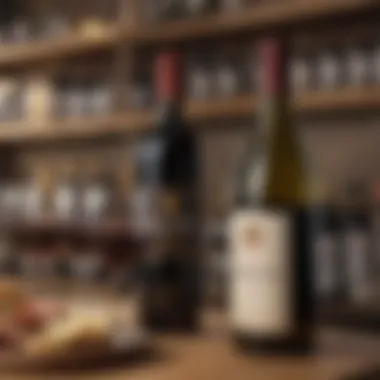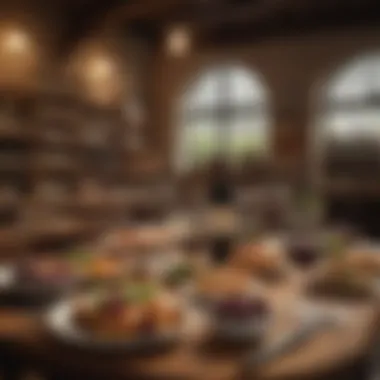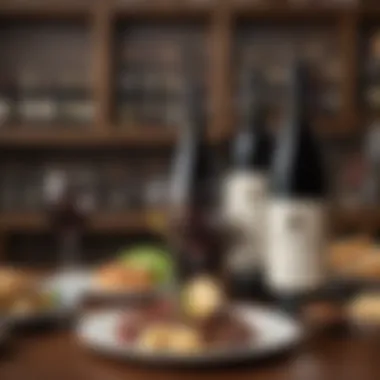Discovering the Richness of Kosher Wine Clubs


Intro
In recent years, the popularity of kosher wine clubs has been on the rise, attracting a diverse audience that includes both seasoned wine aficionados and novices eager to explore this unique segment of the wine market. The intersection of Jewish dietary laws and wine production has given rise to a fascinating culture that these clubs embody. Beyond just a selection of wines, they offer a community experience that enriches the appreciation of kosher wines.
Kosher wines are produced under strict guidelines laid out by Jewish law, which affects how they are made, handled, and consumed. This adherence to tradition does not stifle creativity or innovation; rather, it cultivates a rich tapestry of flavors and styles that are often overlooked in the broader wine community. Kosher wine clubs serve as gateways, guiding individuals through this intricate world while also bridging gaps between cultures and palate preferences.
As we dive deeper into this topic, we will explore the nuances of membership options, educational opportunities through tastings, and the potential for discovering new favorites from the evolving kosher wine market.
Therefore, whether you're simply curious or already familiar with the pleasures of kosher wine, this guide aims to provide insights that illuminate the benefits and joys of joining a kosher wine club.
Preamble to Kosher Wine
Understanding kosher wine goes beyond simply checking a label for a certification. It is actually about appreciating the intricate relationship between tradition, spirituality, and the meticulous practices involved in its production. This section aims to establish a foundation for our exploration into kosher wine clubs, which are proving to be a bridge between age-old customs and modern wine appreciation.
Defining Kosher Wine
At its core, kosher wine is wine that adheres to dietary laws defined by Jewish tradition. However, the designation is not solely about avoiding certain ingredients. For a wine to be labeled kosher, it must be produced under the supervision of a rabbi, which ensures that every step of the process—from the vineyard to the bottling—meets the halachic standards, or Jewish law. This includes using only equipment that is considered kosher, and employing only Jewish individuals in the production process, particularly during significant phases such as crushing grapes and bottling. Because of these requirements, wines labeled as kosher can often have unique characteristics that appeal even to non-Jews.
Historical Context of Kosher Wine
The roots of kosher wine run deep into history. It has been a significant part of Jewish rituals for centuries, with evidence linking wine consumption to ancient religious practices. The Talmud references wine as essential for Shabbat and festivals, emphasizing its importance in ceremonies and life celebrations. For many communities, kosher wine is not merely a drink; it is an embodiment of heritage and religious identity. The Kedushah, or sanctification, often occurs over a cup of wine during Shabbat, highlighting not just its cultural relevance but also its sacred role within Jewish observance. This context enriches one’s appreciation for kosher wines and demonstrates how they serve both spiritual needs and social gatherings.
Importance of Kosher Rules
The rules governing kosher wine serve multiple purposes, from spiritual to practical. On a spiritual level, they create a sense of sanctity and respect toward the production process. When individuals are aware that their wine is produced according to these strict guidelines, it enhances their tasting experience—adding depth to each sip. Practically, kosher rules assure quality and integrity. These wines tend to be produced with a focus on maintaining high standards, often leading to craftsmanship that reflects the skill of the winemakers.
"Kosher wine is not just about adherence to rules; it’s about the connection between every bottle and centuries of tradition, imbued with meaning and purpose."
For enthusiasts, understanding kosher wine goes hand in hand with a greater appreciation of the nuances that each bottle brings. With a growing interest in diverse wine experiences, this exploration provides an essential understanding of where kosher wines fit into contemporary wine culture.
What Are Kosher Wine Clubs?
Kosher wine clubs represent a niche community within the larger wine enthusiast landscape. These clubs are essential not just for their focus on kosher wines but also for the unique culture they foster among their members. By being part of a kosher wine club, individuals can engage with a variety of wines that adhere to Jewish dietary laws, all while enjoying a social experience filled with tastings, discussions, and discovery.
Concept and Structure of Wine Clubs
The essence of a wine club typically lies in its capacity to curate wine collections from various regions, sources, and styles. However, kosher wine clubs delve deeper. They are structured around providing wines that have been certified kosher through a series of specific processes, which may include special supervision and handling from production to bottling.
In a typical wine club, members usually subscribe either monthly or quarterly, receiving shipments that include a selection of curated bottles. Kosher wine clubs might stand out with additional considerations, ensuring that wines are produced in alignment with Kosher guidelines and traditions. These might involve:
- Curated Selection: Members receive carefully chosen wines, often representing diverse grapes, regions, and vinification methods.
- Educational Content: Many clubs provide literature or host discussions around the selected wines, educating members on the unique attributes of kosher wines.
- Special Events: From tastings to winery tours, exclusive member events help to build community and enhance the experience.
This format not only allows for broader exploration of kosher wines but also creates a supportive learning environment amidst an engaging community.
Types of Kosher Wine Clubs


(Unique characteristics set different kosher wine clubs apart, catering to various tastes and preferences.)
There are several types of kosher wine clubs available, each with its particular focus:
- General Kosher Wine Clubs: These clubs cater to a broad audience and offer wines from multiple countries. They tend to focus on providing a representative sample of kosher wines, from affordable options to premium selections.
- Geographical Clubs: Some wine clubs focus on specific regions, such as those that offer Israeli wines or selections from California. This allows members to develop a distinct palette while learning about the varietals from those specific areas.
- Theme-Based Clubs: These clubs may revolve around particular wine styles, such as organic, biodynamic, or sparkling kosher wines. They are great for members who want to explore specific wine-making philosophies or pairings.
Understanding these types allows enthusiasts to make informed choices when selecting a kosher wine club best suited to their tastes and interests. Whether you're simply dipping your toes into the world of kosher wines or already well-versed in their complexities, engaging with a kosher wine club can be a rewarding experience, combining education with a sense of community.
Membership Benefits
When embarking on the journey of exploring kosher wine clubs, it's essential to understand the numerous benefits that membership brings. These clubs are not simply about acquiring bottles of wine; they open a door to an enriching experience that interlaces knowledge, community, and exclusive access. Let’s break these benefits down into compelling components that attract both newbies and seasoned wine enthusiasts alike.
Access to Exclusive Wines
One of the strongest appeals of joining a kosher wine club is the access to exclusive wines not easily found in the typical retail outlets. Many clubs have partnerships with boutique wineries, meaning members can savor unique selections crafted by passionate winemakers eager to share their art.
Some of these wines might include limited editions or small batch productions that remain under the radar, unavailable to the general public. Members often have first dibs on new releases or involve themselves in private tastings that showcase the club's offerings.
- Special selections often feature:
- Limited-edition releases that may not reach the open market.
- Unique blends that showcase the winemaker’s creativity.
- Educational notes that enlighten members on varietals and terroirs.
Being part of a kosher wine club can feel like being in an exclusive club of your own. You’re not just drinking wine; you’re tapping into rare offerings that can elevate your palate to heights you didn’t know existed.
Educational Opportunities
Wine tasting is as much about learning as it is about enjoyment. Membership in a kosher wine club often comes with educational opportunities that are both engaging and informative. Many clubs host masterclasses, tastings, and events where members can deepen their understanding of kosher wines and wine culture in general.
Through these sessions, members can expect:
- Insights into the complexities of kosher winemaking.
- Guidance on how to properly taste and evaluate wines.
- Pairing suggestions for food that really hit the mark.
These educational outings create environments where connoisseurs can flourish. They provide food lovers not just with knowledge, but the joy of sharing that with friends and family, creating memorable experiences.
Community and Networking
Membership also provides a chance to connect with like-minded individuals who share a passion for kosher wines. The sense of community and networking woven into wine clubs is among the benefits often overlooked. Engaging with fellow members often leads to forging friendships built around shared tastes and experiences.
Attending club events, whether they be formal tastings or casual gatherings, offers opportunities for:
- Meeting local winemakers or industry experts.
- Sharing tips and recommendations about food pairings and beyond.
- Developing a support network for those looking to enhance their wine journey.
In essence, kosher wine clubs serve as more than just a service; they are a niche community where shared experiences over a glass of wine lead to lasting friendships and fellowship.
"Wine is constant proof that God loves us and loves to see us happy." – Benjamin Franklin
Selecting a Kosher Wine Club
Choosing the right kosher wine club can be a delightful yet daunting challenge, especially for those new to the kosher wine scene. The variety of clubs available can boggle the mind, each offering something unique, whether it's a selection of rare wines, educational resources, or community engagement. Knowing what to consider can help a novice make informed decisions while offering seasoned enthusiasts fresh insights into what these clubs provide.


Considerations for New Members
When diving into the world of kosher wine clubs, it’s crucial for new members to identify their preferences and expectations. Here are some practical elements to ponder:
- Budget: Establish a budget upfront. Wine clubs can range in price, from economical options to premium selections. Knowing your limits helps narrow down options quickly.
- Wine Varietals: Some clubs focus on specific types of wine like reds, whites, or sparkling. Choose one that aligns with your taste. If you fancy robust reds or delicate whites, ensure the club matches your palate.
- Frequency of Deliveries: How often do you want to receive shipments? Some clubs offer monthly deliveries while others might do it quarterly. Keeping this in mind can help manage expectations and surprise parties alike.
- Additional Perks: Look for clubs that offer educational sessions, tasting events, or exclusive access to limited release wines. This can enrich your experience beyond just receiving bottles.
- Kosher Certification: Not all kosher wines are created equal. Ensure the club strictly adheres to kosher certifications and follows the appropriate guidelines to maintain authenticity.
Taking these factors into account will set the stage for a rewarding experience in the kosher wine community.
Comparative Analysis of Clubs
Once you’ve established your baseline preferences, it’s time for a comparative analysis of the kosher wine clubs available. This is where you can really see which club suits your needs best. Here are some clubs that might stand out:
- The Kosher Wine Club: This club is known for its diverse selections and themed shipments, offering members a chance to explore different regions and styles each month. Their focus on education through wine tastings adds tremendous value.
- Royal Wine Corp: They have a substantial inventory to choose from, emphasizing traditional kosher wines. Their seasonal selections highlight unique blends and vintages prevalent during various Jewish holidays.
- Wine on the Vine: For those in search of a personal touch, this club specializes in hyper-local wines and has an accessible network of boutique wineries. They deliver curated selections based on member feedback, which is ideal for those wanting to feel part of the process.
Comparing the benefits and offerings of these clubs shows how diverse the kosher wine landscape is. Each one brings something different to the table, ensuring there's a perfect match for every wine enthusiast.
"Selecting the right kosher wine club is not just about the wine; it’s about joining a community that shares your passion and enhances your understanding of this rich tradition."
Arming yourself with knowledge will ensure your venture into kosher wine clubs is fulfilling and enjoyable.
Cultural Significance of Kosher Wine
Wine has long occupied a cherished spot in Jewish life, functioning as a symbol of joy, sanctity, and tradition. It is woven into many religious practices, transforming the act of drinking wine into an integral part of cultural rituals.
Kosher Wine in Religious Practices
Kosher wine is not just about dietary restrictions; it embodies spirituality and historical continuity. Within Jewish tradition, wine is associated with many religious ceremonies such as Shabbat and Passover. During Shabbat, for instance, wine introduces a festive atmosphere. It’s customary to recite a blessing over wine known as Kiddush before the Shabbat meal, which marks the sanctification of the day. The importance of wine here isn’t incidental; it signifies joy and the divine blessing of creation.
Additionally, during Passover, the consumption of four cups of wine is obligatory to commemorate the Israelites’ liberation from Egypt. This ritual commemorates not just the historical event but also emphasizes community and connection among families. Kosher wine plays an essential role in these traditions, ensuring that they are not only sacred but also can be genuinely enjoyed.
The process of creating kosher wine involves strict adherence to Jewish law, or halakha, ensuring that every step, from vine to bottle, meets these spiritual guidelines. Therefore, the enjoyment of kosher wine is steeped in history, ritual, and respect for the divine.
Celebrating Jewish Heritage Through Wine
Wine tasting in the context of kosher varieties is more than just exploring flavors; it's about embracing and celebrating Jewish heritage. Each bottle tells a story, connecting drinkers to their ancestry, traditions, and collective memory. In this way, kosher wines become a medium for preserving cultural identity and history.
Wine can also serve as a bridge between generations. Families share stories and traditions during wine tastings, passing down knowledge about the significance of certain vineyards or varietals. This celebratory act encourages a depth of appreciation not just for the beverage itself, but for the rich Jewish customs that it signifies.
How about some thoughts on sharing kosher wine at community events? It acts like a unifying spirit, drawing people together in festivity and remembrance through the simple act of sharing a glass. Communal meals often feature kosher wine, breaking down barriers and fostering connections. This mutual sharing of experiences around wine extends beyond mere consumption—it creates opportunities for dialogue, understanding, and connection among diverse groups.
"Wine not only elevates the meal but also elevates the spirit, allowing individuals to embark on communal journeys of culture, belief, and memory."
The Market for Kosher Wines
The market for kosher wines is an intriguing tapestry of tradition and modern appeal. With a growing emphasis on quality and authenticity, kosher wine has become more than just a religious obligation; it has blossomed into a vibrant sector where creativity meets heritage. This article section illuminates why the kosher wine market is worthy of exploration, focusing on the benefits it offers to consumers and the ever-expanding opportunities for wine lovers.
Growth of the Kosher Wine Industry


The growth trajectory of the kosher wine industry is nothing short of remarkable. Once marginalized, kosher wines are now making waves on a global scale. The shift began in the 1990s when producers recognized the potential for quality kosher options that could appeal beyond strictly Jewish markets. Today, innovation and attention to detail distinguish many kosher wineries.
Some key factors fueling this growth include:
- Diverse Offerings: Kosher wine isn't limited to sweet Manischewitz; now, there are dry reds and whites that compete with some of the best non-kosher varieties from regions like Bordeaux and Napa Valley.
- Global Reach: Countries such as Israel, France, and the United States are leading the charge, developing offerings that cater to diverse tastes and preferences.
- Consumer Awareness: With people becoming more health-conscious and informed about their choices, there is a greater appreciation for organic and biodynamic kosher wines.
Innovations and Trends
As the kosher wine scene continues to evolve, new trends and innovations are shaping the industry. More wineries are embracing progressive production techniques while adhering to kosher laws. This blend of tradition and modernity results in wines that excite fortified palates. Here are a few noteworthy trends:
- Sustainable Practices: An increasing number of kosher wineries are prioritizing eco-friendly cultivation methods. This not only attracts environmentally conscious consumers but exemplifies a shift towards thoughtful practices in wine production.
- Unique Flavor Profiles: Winemakers are experimenting with different grape varieties and blending techniques to create complex flavor profiles. For instance, the use of rarer varietals like Sangiovese in kosher wine is gaining traction.
- Interactive Experiences: Some wineries are stepping outside the box by offering immersive tastings and vineyard tours. This blend of education and enjoyment not only enhances appreciation but also fosters community involvement.
"The kosher wine market is a gateway to understanding not just the product but the people and traditions behind it."
In summary, the kosher wine market is thriving due to its commitment to quality, a wide array of offerings, and trends that resonate with modern consumers. For anyone interested in exploring this distinctive world, the opportunities are both promising and plentiful.
Wine Tasting Etiquette
Wine tasting is a cherished tradition that transcends mere consumption of a beverage. It's an experience steeped in culture, art, and, for many, spirituality. Understanding proper wine tasting etiquette ensures that aficionados and newcomers alike can appreciate every facet of what transforms grape juice into a sophisticated libation. This practice is particularly relevant in the realm of kosher wine, where tradition and adherence to specific guidelines play a pivotal role. Enthusiasts in kosher wine clubs can greatly benefit from mastering these etiquettes, allowing them to enjoy their tastings more profoundly and respectfully.
>
Mastering wine tasting etiquette not only enhances personal enjoyment but also fosters respectful interaction in social settings.
Understanding the Tasting Process
When it comes to tasting wine, the process is both an art form and a sensory journey. To savor kosher wines fully, one must engage in a structured method. This generally involves four key steps: look, swirl, smell, and taste.
- Look: First, observe the wine's color and clarity. A kosher wine should exhibit a brilliant hue, be it a bold red or a crisp white. The clarity signifies good filtration, and observing the wine’s legs can give clues about its alcohol content.
- Swirl: Gently agitating the wine in the glass releases its aromas. This step is particularly crucial for kosher wines, as they often have rich, complex scents that reflect their vineyard origins. Swirling should be done softly to avoid spills.
- Smell: Take a moment to inhale deeply. A kosher wine's aroma can transport you to the vineyard itself. Notes might range from fruity to earthy, and recognizing these scents establishes a connection with the wine’s journey.
- Taste: Finally, take a small sip and allow the wine to coat your palate. Note the balance of flavors—the harmony between sweetness, acidity, tannins, and body. Different kosher wines will exhibit unique profiles that might surprise you with their complexity.
Pairing Kosher Wines with Food
Pairing food with kosher wines can be a delightful exploration in taste. Each wine has its personality, and aligning it with the right dish can elevate both experiences. Here are some considerations to keep in mind:
- Red Wines: Typically pair well with heavier dishes such as meats and rich sauces. For instance, a nice Cabernet Sauvignon complements a perfectly grilled steak or a hearty stew.
- White Wines: Often suited for lighter fare. Bright, zesty whites, such as Sauvignon Blanc, can liven up seafood dishes and salads, creating a refreshing palate experience.
- Sauce Matters: It's not just about the main ingredient. The sauce can define the pairing. A sweet sauce might be better matched with a sweeter wine, while a spicy dish can call for a full-bodied red to balance the heat.
- Experiment: Kosher wine enthusiasts are encouraged to play around with pairings. Sometimes unexpected combinations turn out to be the most satisfying—like a dessert wine shared with cheese. Each sip and bite creates a new story, and the excitement of discovery is part of the experience.
Overall, mastering wine tasting etiquette and understanding food pairings are invaluable skills for participants in kosher wine clubs. These practices enrich one’s appreciation for the diversity found within kosher wines and open up avenues for greater social interaction and cultural connection.
The End
Summarizing the essence of kosher wine clubs goes beyond mere observations about wine. It’s about understanding a cultural touchstone and how these clubs reflect broader trends in society and consumption.
Future Prospects for Kosher Wine Clubs
The future of kosher wine clubs seems bright, providing a unique juxtaposition of tradition meeting modernity. As more individuals delve into Jewish heritage, clubs are likely to see increased membership from diverse backgrounds. Couples frequently seek the perfect blend of heritage and experimentation, spurring a demand for innovative offerings. Customizable subscription options, tastings that might blend with exclusive culinary experiences, and more interactive virtual events will likely surface as popular trends. As the overall wine market evolves, those who can embrace and adapt to shifts in consumer preferences stand to thrive. Trends suggest that social media will play a bigger role, with online communities sharing their experiences and recommendations, thus bringing even more folks into the fold.
Encouraging Exploration and Appreciation
Promoting a love for kosher wine starts with creating accessible opportunities for exploration. These wine clubs can offer introductory classes, online webinars, or community gatherings that demystify the entire experience, allowing both novice and experienced drinkers to enjoy without any apprehension. Engaging tastings where participants can learn directly from winemakers or sommeliers can foster a genuine appreciation for the complexities of flavor, aroma, and pairings. Moreover, crafting social media campaigns that encourage sharing personal stories or wine experiences will encourage a sense of belonging and community among members. Ultimately, it's about cultivating an environment where curiosity can flourish and where every sip encourages a deeper connection to both the wine and the cultural narratives behind it.
"Kosher wine is not merely a drink; it's a connection to history, community, and tradition."
The final thoughts on kosher wine clubs undoubtedly point toward a promising landscape. Wine enthusiasts, whether they self-identify as traditionalists or modernists, find themselves at a unique crossroads of taste and tradition. Encouraging broader awareness and appreciation can only enhance the presence of these clubs, undeniably playing a crucial role in the evolution of kosher wines.















